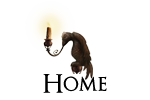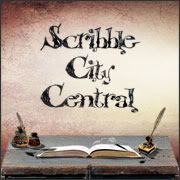It's not often I feel that my words are redundant on this blog--but I pretty much do today. Anne Rooney is a woman of many talents, an author of books on every subject from Einstein to Volcano, Cambridge Lector of the Royal Literary Fund (which makes her scarily intelligent) and an ace website designer. In addition to all this, Anne has a very unique and useful blog called Stroppy Author's Guide to Publishing. I take the liberty of quoting from its 'mission statement' here--it will give you a flavour of why Anne also makes me laugh a lot. "So - now you're a writer. You've got your book deal and drunk the champagne. Congratulations. What next? Is this book going to be a one-off or just your first? If the former, don’t worry your pretty little head over things like repro, margins, PLR, bogits, bungs and e-ink...." I've never had dealings with a bogit or a bung myself, but it's comforting to know there's a bogit 'n' bung expert on hand should I ever need one. However, none of these things are why I feel redundant (I know you were wondering). That comes down to the fact that the Amazing Anne, cornucopia of arcane knowledge that she is, even knows about hagfish vomit. No. I'm not joking. How can anything I have to say now compete with that? A woman who knows about hagfish vomit trumps pretty much anything I can muster in the way of a follow-on, really, so I'll shut up quite soon and let her get on with answering my Mythic questions.
I've talked to Anne at length on the subject of myths (of course she knows about myths as well), and I think you'll find her answers below witty, erudite and incredibly informative. She's certainly taught me several things I didn't know. As for what she terms her 'bio bit'--all I will say is that it contains eagles, skewers and kebabs. I just hope no one chokes on their morning coffee, that's all. Welcome to Scribble City Central, Anne, and over to you forthwith. Thanks so much for visiting (but not so much for making me spit shortcake crumbs all over my keyboard).
1. Do you think that the retelling of myths is important or relevant for the children of today? Why should they care about some “dry old stories” which come from ancient or forgotten cultures they might never even have heard of?
‘Why the hell is that half-naked guy holding a head covered in snakes? What was that artist ON?’
‘Look at those old men leching after the bint! Are they paedos, or what?’
So goes a visit to an art gallery if you’re never heard of Perseus and Medusa, or of Susanna and the Elders. The myths of ancient societies run like a seam of gold through all of European culture. Our own heritage is a closed book if we don’t know them.
If you want to go to a fancy dress party painted all blue, it’s cooler to go as Krishna than a smurf. I got to paint one of Big Bint’s friends all green when he and his girlfriend went to a party as Isis and Osiris. If they hadn’t known their myths, it might have been the Jolly Green Giant or Green Cross Code man – a sad and shameful waste of face paint that would have been.
But more than that, the myths of all cultures speak to us about our common humanity. That we are captivated by the stories of the Aztecs, the ancient Japanese and the Inuits, as well as by the tales that form our own heritage, is testament to the enduring same-ness of human beings. We might have an iPad and central heating, but we’d still readily tear the world apart when betrayed by a friend or dumped by a lover – nothing changes.
Storytelling forges a bond between people across all times and places, and it can undermine narrow political propaganda. How we can think people of the past, or of ‘enemy’ states, are so very different from us if their stories tell of the same human emotions and motivations as we feel ourselves? Stories that have survived have done so because they say something that is true for all time. They are not ‘dry’ stories though there may be dry tellings of them.
All ages find their own ways of retelling traditional stories – oral storytelling, painting, drama, written tales, films, animation... What about Jim Henson’s muppetising of the Greek myths in The Storyteller? (Perseus and Medusa on YouTube is HERE) Or Marcia Williams’ comic-book versions of the Illiad and the Odyssey?
2. What age were you when you came across your first myth or myths? Tell us how you felt then about the myths you first discovered. Did you love them or hate them? Did they scare you, excite you—or were you indifferent? What kind of myths were they? Greek? Norse? Native American? Celtic? Or from another culture entirely? Were they in a book you read? Or did you hear them as oral storytelling from someone else?
I can’t remember a time when I didn’t hear myths, so I don’t know which was the first. My father told me the stories of the Greek gods, and the Romans, and some of the Norse myths, and the Arthurian stories, from when I was very tiny. I wasn’t keen on the Romans. What they good for? Roads and fighting. Yawn. I liked stories with scary monsters best, and of people outwitting those more powerful than themselves. I suppose that’s what children do to their parents all the time.
When I was quite young, I was given two books of myths for Christmas: one Greek and one Egyptian. For a long time I ignored the Egyptians to frolic with the familiar Greeks, but one day I dipped a toe in the stories of the Nile and was swept away by the current. I loved the Egyptians after that, and even wanted to become an Egyptologist. I was captivated by this culture that had a green god, and a goddess who scoured the Earth for every fragment of her beloved husband’s corpse. I wanted that all-consuming passion, a spirit that would face anything, even – especially – the impossible. Orpheus’s trip to the underworld was suddenly nothing – a jaunt with a harp to play a gig to spirits, who probably weren’t too fussy, and the only trick not to look back? Amateur! I wanted to search every crevice of the globe for scraps of flesh.
3. Looking back, what is your favourite myth of all time, from any culture? And why would you choose it?
Oh, did I answer that already? No, I’m not sure. Maybe Pandora. Why wouldn’t you look in the box? Is the world not divided into people who open the box and people who don’t? Take the money/open the box. Box every time, no matter what.
See, you can’t even understand Dr Who if you don’t have the mythical background….
4. Who is the mythical hero, heroine or being you most dislike, and what made you feel that way about them?
Atalanta because she is such a WAG. She’s 100% materialistic bint: ‘Ooh, look a bauble… let me stop and pick it up.’ Well, dur! Get on with the race, airhead! And she only wanted to marry someone strong and good at running, not someone smart enough to cheat. As for Melanion – well… why did he even want the ditzy bint? He should have won and then refused to marry her, just to make the point. They make me angry. They are the Posh and Becks of the ancient world. Which proves my point in question 1, I suppose….
5. Is there a mythical beast you are particularly fond of? If so, which one?
Oh, so many! Gorgons are most certainly very cool. But then there are basilisks, which I have rather a soft spot for. Things that can kill with a glance, the femmes fatales of the myth world.
Those skeletons that spring from Hydra’s teeth are neat. Oh, and the whales that come from Sedna’s fingers as they are cut off by her father when she clings to his boat. I suppose they are an ordinary creature, but with a mythical genesis. Doesn’t that just underline the wonderfulness of real creatures, that we make up myths to explain them? I’ve long been a fan of T.H.White’s Book of Beasts which mixes mythical and real with gay abandon. I even wanted to do my PhD on its source. (My PhD supervisor wouldn’t let me because he said my insular Latin was crap, which is true, and a fair objection.)
Actually, I rather like the raven Noah sent from the ark who couldn’t be arsed and just ate the dead things. Does that count?
6. How have myths had an influence on your writing life, if at all?
How can they be disentangled from it? The only straight retelling I’ve published is a version of King Arthur and the Knights of the Round Table, but I’m very interested in taking mythical elements and reworking them. I wrote a story a long time ago in which a boy is charged with looking after a bunch of mythical creatures and he had been left things like sunglasses and a bag. He had to work out which things could go together and which couldn’t, why he needed the sunglasses and so on. It’s out of print now (thankfully – it was probably quite bad!)
I’ve also got a collection of half-written re-workings of traditional European stories, though they’re not really myths, moved into modern settings. I’m finding it fascinating how easy it is to transpose these old stories. Bluebeard (there’s another Pandora) and Hansel and Gretel (eating your children never goes out of fashion) are so easily reworked for the modern world – as long as you situate them in Haringey where you can be sure social services will leave your characters to get on with it.
7. If you could choose to be the demigod child of any one mythical god or goddess, which one would it be? Which power would you like to inherit from them—and what would you do with it?
Has anyone said they want to be Christ? No, it sucks really.
I think I might be a daughter of Quezalcoatl because having a feathery serpent around would be quite awesome. As he was considered responsible for human culture I might claim creativity as my special power. Does it count? It is a god-like power, the ability to make entire worlds out of nothing, don’t you think?
More about Anne:
Five random facts about me:
1. I first sent a book to a publisher when I was about 12. It was sent back by the receivers – poor choice of publisher. That’s still happening….
2. There’s a pond in my garden with an island called Monster Island. It was named optimistically, but the only inhabitant is a terrapin called Jeffrey. Jeffrey eats fish from Waitrose, which is not very monstrous behaviour.
3. I was stung by a jellyfish in Albania. I kicked it. It stung me again. I had to be coaxed out of the sea before I kicked it again. Story of my life.
4. My favourite book as a child was Edward Gorey’s La Chauve-souris dorée. It’s about a girl who finds a dead bat.
5. I have fed kebabs to eagles in the Gobi. Beware of falling skewers if you try it.
Anne's website is HERE
Anne's blog is HERE
You can follow Anne on Twitter HERE
Subscribe to:
Post Comments (Atom)

















13 comments:
Wonderful! Anne you so make me laugh - only you could make all those connections in an interview about myth and legend..Dr.Who, WAGS, fancy dress parties....you already have the God-like power of creativity, we must find you a feathery serpent.....Thank you both for time while I drank my tea this morning :O)
'The raven who couldn't be arsed and just ate the dead things.' You have given me such a good laugh this morning, Lucy and Anne - WONDERFUL interview! Thanks! x
(And Lucy, I can see why you got crumbs in your keyboard.)
It was Gillian who sent me here and I'm glad I came. You gave Anne the feeds and she played beautifully with them. It's a wonderful mix of casual learning, effortless culture and crackling insights into who we are and how we share so much with other cultures and long-dead people. It's also bloody funny. If I didn't already know about Anne and hadn't already read her, this would have sent me scuttling to find her books.
Ditto what the others said; love it! Thanks Lucy and Anne; made my morning!
Yep. Knew my instinct was correct about the crumb-spitting potential of this MFI, and the comments so far back me up. Trust that many people all over the world are now cleaning out their keyboards.
Hadn't got to my lunch, so keyboard is safe, thanks.
I trust this was your last Mythic Friday thingy, Lucy? Nobody could come after Anne. (If you do, I feel sorry for you, whoever you may be.)
Redolent of Anne, she of the razor-sharp wit and seriously scary erudition. Brilliant interview: voiced my thoughts about Atalanta perfectly! Thanks to you both. And Bookwitch is right: pity the poor soul who has to follow that.
Wonderful Anne-view of the mythic world! Thanks, both. Luckily I'm only drinking tea so no afternoon key board crumbfest here.
Wonderful Anne... it ran like wildfire through dry grass! Throwing cheese into the air for forked-tailed drongo's will no longer have quite the same thrill... after kebabs to eagles in the Gobi!!! Bill was right... a wonderful mix of casual learning, effortless culture and crackling insights!
Most entertaining - thanks Lucy and Anne. My favourites are the Norse myths - but then , I am from Yorkshire!
Very entertaining - thanks for the interview Anne and Lucy. :)
great interview! thanks!
Thank you, everyone for your lovely, kind comments. And a huge thank you to Lucy, of course, for inviting me.
Diane - I really want to know where I can throw cheese at drongos. (Except in my own kitchen, when the bints have invited some drongos home, of course.)
Post a Comment